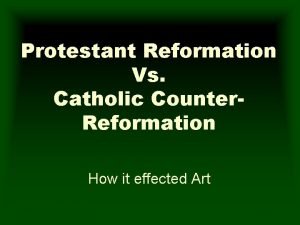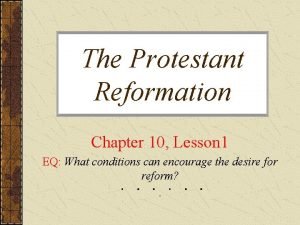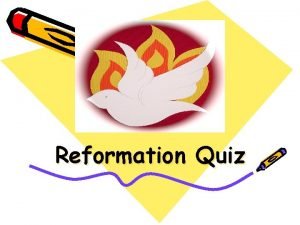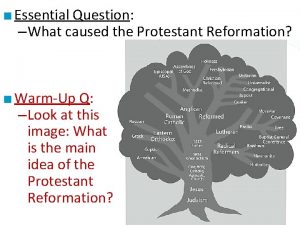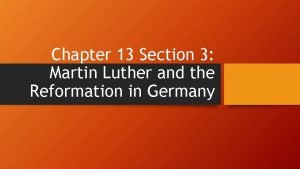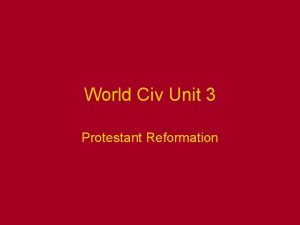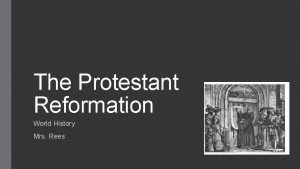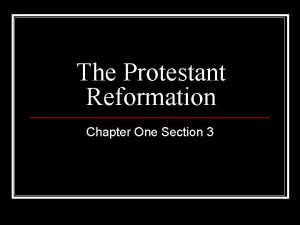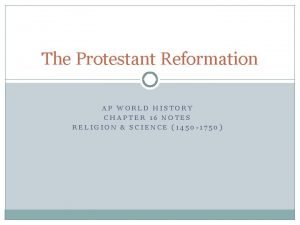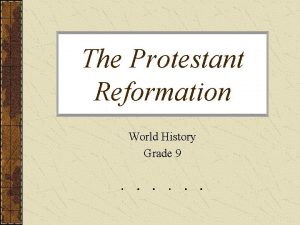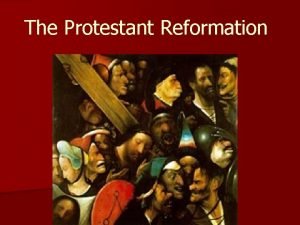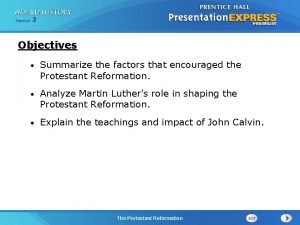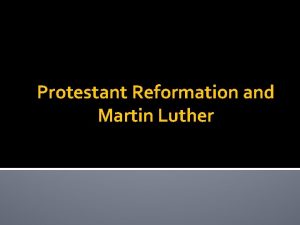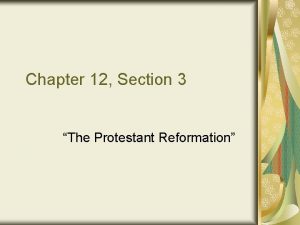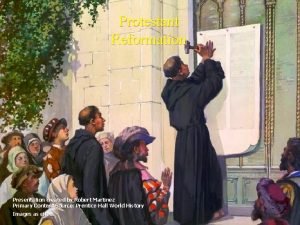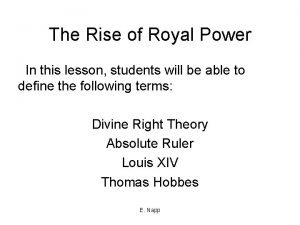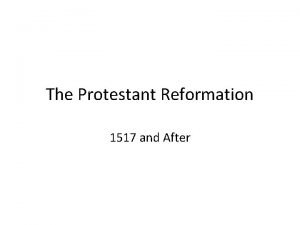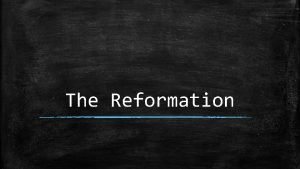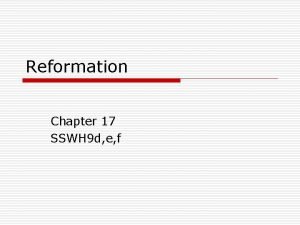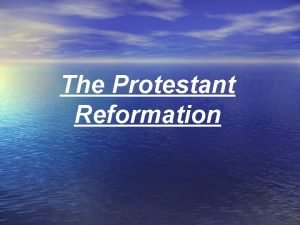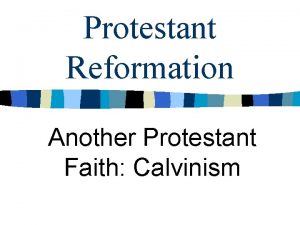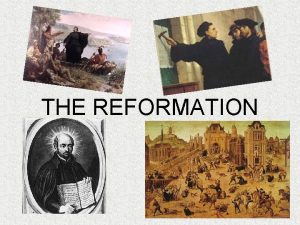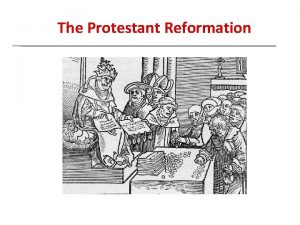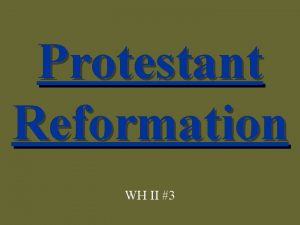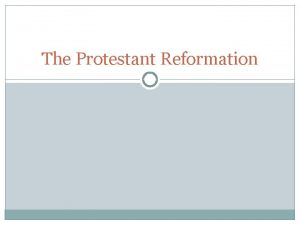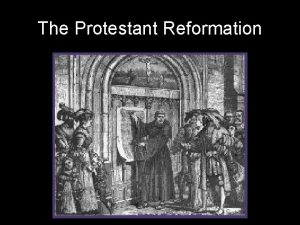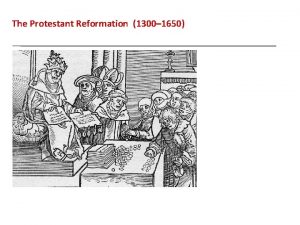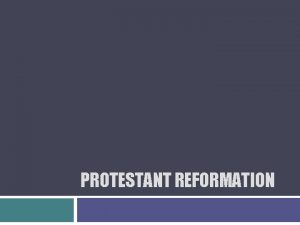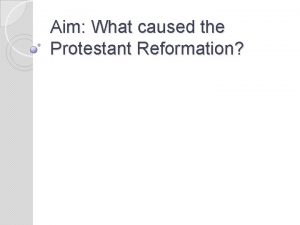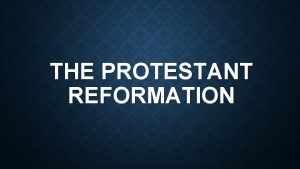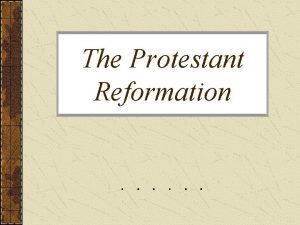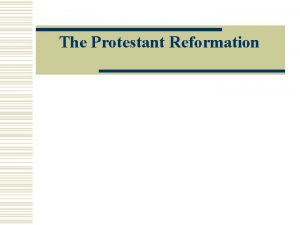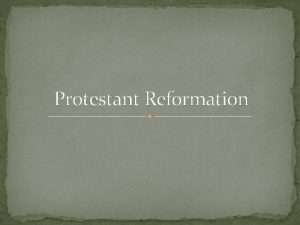The Protestant Reformation Standard SSWH 9 The student



















- Slides: 19

The Protestant Reformation








Standard: SSWH 9 The student will analyze change and continuity in the Renaissance and Reformation. EQ: What were the causes of the Reformation?

The group of Popes known as the Renaissance Popes failed to meet the Church’s spiritual needs (Julius II) Corruption in the Church was a major factor that encouraged reform

Causes of the Reformation Emphasis on the secular and the individual challenged Church authority Rulers began to challenge Church authority Merchants resented paying church taxes to Rome

Johann Tetzel • Sold indulgences (pardons) to raise money for work on St. Peter’s Basilica • remembered for selling indulgences using the catchy line, "As soon a coin in coffer rings, the soul from purgatory springs. " • created a chart that listed a price for each type of sin and claiming that the indulgences he sold could save a soul

Martin Luther • “Father” of the reformation • Stated humans are not saved through good works, rather through faith • Stated the chief guide to the religious truth was the Bible • Created 95 theses outlining the abuses of the church and posted them on the door of the castle church in Wittenberg. • Luther’s actions began the Reformation.



Reformation in Switzerland • Ulrich Zwingli was a priest in Zurich who began a religious movement which included the elimination of relics, images, and decorations in churches. • In 1531, led an army against the Catholic church.

John Calvin: Calvinism • John Calvin was a native of France who fled following his conversion to Protestantism. • Agreed with Luther that people received salvation through faith alone. • Taught theory of predestination. • Came to power in the city of Geneva.

• Developed the Consistory or enforcing body that oversaw the moral life of the citizens. • Calvin trained missionaries who spread his ideas throughout the whole of Europe.

The Anabaptists • Anabaptism was especially attractive to peasants and most of the middle class. • Favored adult rather than infant baptism. • Considered all believers to be equal. • Believed in the complete separation of church and state.
 Protestants vs catholic
Protestants vs catholic Chapter 16 lesson 1 the protestant reformation answer key
Chapter 16 lesson 1 the protestant reformation answer key How did martin luther start the protestant reformation quiz
How did martin luther start the protestant reformation quiz What caused the protestant reformation?
What caused the protestant reformation? Chapter 13 section 3 the protestant reformation
Chapter 13 section 3 the protestant reformation Protestant beliefs
Protestant beliefs Reformation rap
Reformation rap Give up one’s views or beliefs
Give up one’s views or beliefs Reformation ap world history
Reformation ap world history Crash course protestant reformation
Crash course protestant reformation The protestant reformation crossword puzzle
The protestant reformation crossword puzzle What factors encouraged the protestant reformation
What factors encouraged the protestant reformation Unit 3: martin luther & the protestant reformation
Unit 3: martin luther & the protestant reformation Protestant
Protestant Unit 12 lesson 3 the protestant reformation
Unit 12 lesson 3 the protestant reformation Protestant reformation
Protestant reformation Protestant reformation
Protestant reformation Protestant reformation map
Protestant reformation map Protestant reformation kahoot
Protestant reformation kahoot Peace of augsburg def
Peace of augsburg def
